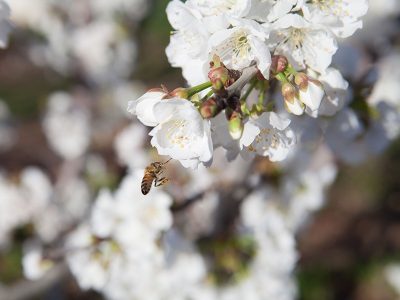Devastation of Bee Colonies in America: Trump’s EPA Said this Bee-killing Insecticide Is Safe, Now Beekeepers Are Suing
Sulfoxaflor is toxic for insects already dealing global pollinator collapse

Today, beekeepers, represented by Earthjustice, sued Trump’s Environmental Protection Agency (EPA) for allowing sulfoxaflor, a bee-killing pesticide linked to a nation-wide honeybee die-off, back on the market. The lawsuit comes as beekeepers around the country lost over 40 percent of their colonies this last year.
Touted as a “next generation neonicotinoid,” sulfoxaflor is like other bee-killing neonicotinoid insecticides: it is systemic, meaning it is absorbed into the growing plant, making it toxic to insects for many days thereafter. When foraging honeybees bring back to the hive pollen and nectar tainted with sulfoxaflor, the effect on the entire colony can be catastrophic.
“Honeybees and other pollinators are dying in droves because of insecticides like sulfoxaflor, yet the Trump administration removes restriction just to please the chemical industry,” said Greg Loarie, Earthjustice attorney. “This is illegal and an affront to our food system, economy, and environment.”
EPA first approved sulfoxaflor in 2013, but thanks to a lawsuit brought by Pollinator Stewardship Council, the American Beekeeper Federation, and Earthjustice, the Ninth Circuit Court of Appeals overturned that decision. The Court ruled EPA failed to obtain reliable studies regarding the impact of sulfoxaflor on honeybee colonies.
In 2016, EPA re-approved sulfoxaflor subject to significant restrictions to reduce the risk to honeybees and other pollinators. On July 12, 2019, without any public notice, the Trump administration removed these restrictions on sulfoxaflor and approved a host of new uses for the bee-killing insecticide.
“It is inappropriate for EPA to solely rely on industry studies to justify bringing sulfoxaflor back into our farm fields,” said Michele Colopy of Pollinator Stewardship Council. “Die-offs of tens of thousands of bee colonies continue to occur and sulfoxaflor plays a huge role in this problem. EPA is harming not just the beekeepers, their livelihood, and bees, but the nation’s food system.”
Pollinators’ ecological service in the country is valued at $200 billion every year, according to government data, and more than 80 percent of plants worldwide need pollinators to survive.
Sulfoxaflor is produced by Corteva formerly Dow AgroSciences. Sulfoxaflor can kill adult bees at low doses, and when brought back to the hive it can impair the colony’s ability to breed, forage, fight disease and survive the winter, scientists say.
Earthjustice is representing beekeeper Jeff Anderson, the Pollinator Stewardship Council, and the American Beekeeper Federation.
*
Note to readers: please click the share buttons above or below. Forward this article to your email lists. Crosspost on your blog site, internet forums. etc.
Featured image is from CHRIS JORDAN-BLOCH / EARTHJUSTICE

